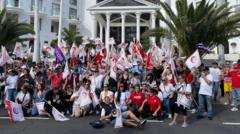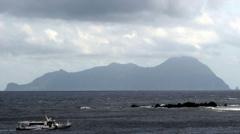Hotel workers in Tenerife have initiated strikes over pay and conditions, warning holidaymakers of possible disruptions over the Easter weekend. While a resolution was reached in other Canary Islands, about 80,000 workers are set to continue their industrial action.
Disruption Looms in Tenerife as Hotel Workers Strike Over Pay and Conditions

Disruption Looms in Tenerife as Hotel Workers Strike Over Pay and Conditions
Travelers heading to Tenerife during the Easter holiday are cautioned about anticipated strikes by hotel workers fighting for better pay and working conditions.
Organizers have announced that hotel employees on Tenerife will stage strikes on Thursday and Friday, coinciding with the Easter bank holiday weekend. Union representatives have indicated that the industrial action was initially planned across the Canary Islands but has since been resolved for workers in Gran Canaria, Lanzarote, and Fuerteventura. However, approximately 80,000 hotel staff members across Tenerife, La Palma, La Gomera, and El Hierro are prepared to strike, citing grievances related to pay and working conditions.
The UK Foreign Office has advised travelers to be aware of potential disruptions during the festive period, encouraging them to consult their tour operators for updated information and heed the guidance of local authorities. Under current laws, striking workers are required to maintain some level of "minimum service." Nonetheless, the Comisiones Obreras union has argued that essential services such as hotel cleaning, food preparation, and entertainment should not be categorized as minimum services.
In a statement, the union described any requirement for maintaining such services during the strike as an "illegitimate" and "disproportionate" infringement on workers' rights. Many of those involved in the protests, like Fernando Cambon Solino, expressed concerns about the disparity between the tourist experience and the realities for local workers. "Everybody knows the Canary Islands," he remarked, highlighting the contrast between visitors' enjoyment and the challenging conditions faced by residents.
Supporting those fighting for better pay and conditions, journalist Rodrigo Padilla shared his personal connection to the issue, with his mother working long hours as a waitress. He emphasized the necessity for improved working conditions, pointing out the long commutes and the strenuous demands placed on workers.
This industrial action emerges against a backdrop of prior protests concerning the impact of mass tourism in the Canary Islands. Local residents have argued that the tourism boom has driven housing prices too high for many locals to afford stable living conditions. While they recognize the tourism sector's crucial role in the islands' economy, contributing approximately 35%, there is a growing call for a more balanced and sustainable tourism model that considers environmental implications and alleviates pressure on housing availability.
The UK Foreign Office has advised travelers to be aware of potential disruptions during the festive period, encouraging them to consult their tour operators for updated information and heed the guidance of local authorities. Under current laws, striking workers are required to maintain some level of "minimum service." Nonetheless, the Comisiones Obreras union has argued that essential services such as hotel cleaning, food preparation, and entertainment should not be categorized as minimum services.
In a statement, the union described any requirement for maintaining such services during the strike as an "illegitimate" and "disproportionate" infringement on workers' rights. Many of those involved in the protests, like Fernando Cambon Solino, expressed concerns about the disparity between the tourist experience and the realities for local workers. "Everybody knows the Canary Islands," he remarked, highlighting the contrast between visitors' enjoyment and the challenging conditions faced by residents.
Supporting those fighting for better pay and conditions, journalist Rodrigo Padilla shared his personal connection to the issue, with his mother working long hours as a waitress. He emphasized the necessity for improved working conditions, pointing out the long commutes and the strenuous demands placed on workers.
This industrial action emerges against a backdrop of prior protests concerning the impact of mass tourism in the Canary Islands. Local residents have argued that the tourism boom has driven housing prices too high for many locals to afford stable living conditions. While they recognize the tourism sector's crucial role in the islands' economy, contributing approximately 35%, there is a growing call for a more balanced and sustainable tourism model that considers environmental implications and alleviates pressure on housing availability.




















